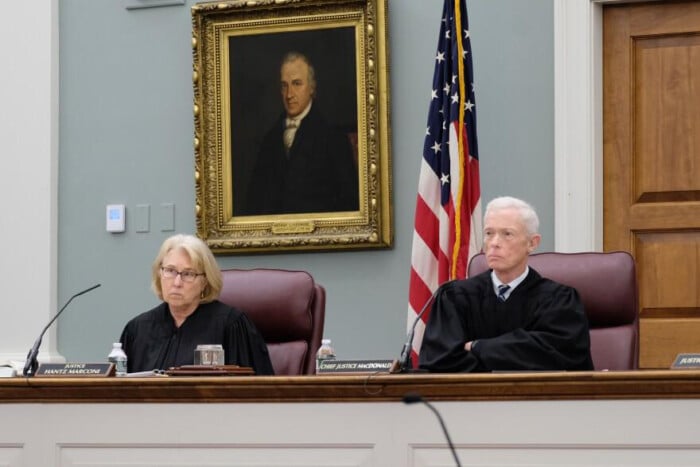High stakes, hard choices: legal perspectives on NH’s housing crisis
Today’s affordable housing crisis is marked by soaring rents and home prices and low vacancy rates
In an ideal world, landlord/tenant lawyers wouldn’t be needed. Today’s affordable housing crisis, marked by soaring rents and home prices and low vacancy rates, is a clear sign we aren’t living in that world.
Today, landlord/tenant lawyers play a critical role when things go wrong by helping tenants stay in homes and making sure both sides understand their rights and responsibilities.
Tri-County Community Action Program CEO Jeanne Robillard says rents and home prices have skyrocketed in her region, and low vacancy rates – driven in part because fewer people are moving – have created a perfect storm for people seeking to secure a home or stay in the one they have.
During the COVID-19 pandemic, the state’s five community action programs (CAPs) dispersed nearly $300 million in rental assistance to low-income people. And today, nearly a year and a half after rental assistance ended, Robillard says many people are struggling with housing challenges.
“It used to be that people could afford to live in Berlin or Gorham; Coos County was more affordable overall but that’s just not accurate now,” she says. “Rents up here are now comparable to other parts of the state.”
Zillow lists the average cost of a two-bedroom apartment in Berlin – where per capita income is $24,569 according to US Census data – at $1,267, up $217 from last year. In Coos County, single-family home prices have risen 104 percent from 2018 to 2023, according to the New Hampshire Fiscal Policy Institute (NHFPI).
According to the NHFPI, the median sale price for a single-family house in New Hampshire reached a record $515,000 in April, and the median monthly rent and utilities cost for a two-bedroom apartment in 2023 was $1,764. In Portsmouth, the median rent for a two-bedroom is $2,700.
Stakes are high for renters
When rental assistance programs administered by the state’s five CAPs dried up at the end of 2022, low-income tenants lost access to that aid. Attorney Brian Shaughnessy, who has one of the largest landlord/tenant practices in the state, believes there haven’t been more evictions for non-payment of rent since the assistance ended. He attributes this to the high cost of rent and low vacancy rates.
“The stakes are higher, especially if you’re a federally subsidized tenant,” he says. “I don’t see as many evictions in those cases because people are begging, borrowing, and stealing, and I think there are other resources available.”
While there has not been a surge of evictions across the state, the average number increased from 438 per month in 2022 to 518 per month in 2023.
Before rental assistance ended and increases in rent soared in the past year, Shaughnessy feared the “floodgates were going to open.”
“That’s because some of the tenants who had relied on rental assistance had gotten used to not paying that monthly rent and weren’t putting it in their budget,” he says. “I’ll tell you the truth, I don’t think there’s any more evictions going on right now for non-payment of rent than were going on before. Precisely because people know they don’t have any place to go.”
Avoiding pitfalls for landlords
Attorney Randall Clark describes himself as a “switch hitter” when it comes to landlord/tenant disputes because of his experience representing both landlords and tenants.
During the pandemic, many of Clark’s clients were landlords trying to evict tenants. He says the standard eviction forms prepared by the courts appear simple, but they are highly procedural and are often loaded with pitfalls.
“It all appears like it’s made for the common man without counsel, and it lures people into a false sense of confidence,” he says. “Sometimes property managers appear acting as a lawyer and think they know everything, but they don’t.”
A common mistake landlords make is checking the box on the eviction form for claims and damages.
“This often opens up affirmative defenses,” Clark says. “If you’re a landlord, you need to understand the consequences of the box you check. It’s simple but complicated. People who aren’t lawyers are lured in by a false sense of security.”
The same goes for his tenant clients, Clark says. “They send me forms they’ve received, and I can make a list of procedural errors made to give them a sense of how easy the case is to defend.”
Shaughnessy says he very rarely advises a landlord to ask for damages when filing an eviction notice.
“The problem you have is that under New Hampshire’s Constitution, if the claim for monetary judgment is above $1,500, the defendant has a right to a jury trial,” he says. “And the last thing a landlord wants to do is be in Superior Court waiting for a jury trial for an eviction. When you check that box, you’re opening Pandora’s Box.”
Clark says he has recently observed landlords trying to clear out tenants who are paying subprime prices.
“I try to help landlords assess the best method for prosecuting a case,” he says, adding landlords who want to evict a client to renovate a property need to provide evidence this is what they truly intend to do. “I prepare my landlord clients, asking, ‘what have you done recently?’ I’ve defeated [these evictions] for tenants because a landlord didn’t make a plausible case.”
The best outcome is an agreement
Shaughnessy is a founding member of 603 Legal Aid, which provides free civil legal services to low-income people.
“I have my landlord hat and I also have a tenant hat,” Shaughnessy says. “I advocate for low-income tenants to preserve their federal subsidies and subsidized housing. And I also evict people on the other side of the fence.”
He says some of the private landlords he represents may believe he has a softness toward tenants because of his work with 603 Legal Aid and his representation of tenants.
“Pretty quickly, they’re abused of that when they talk to me, and I lay out all these bad things that could happen to them by winning their eviction,” he says. “You don’t want to be seven days after an eviction with a bunch of furniture in the apartment.”
His standing recommendation for the best outcome is an agreement.
“Appeals can take months,” he says. “I need an hour to explain that to some people.”
Protecting tenants’ rights
New Hampshire Legal Assistance (NHLA) helps tenants stay in a home, or, when that’s not possible, create the most favorable result. Given the low vacancy rates (see sidebar) for rental units in the state, the biggest impact for NHLA’s clients facing eviction, when an agreement can’t be reached, is significant housing insecurity, says NHLA Housing Security Project Director Lauren Greenwald.
When staying in a home isn’t possible, Greenwald explains NHLA’s goal is damage control.
“We want to give people time to seek a new living situation or a housing subsidy,” she says. “When a long period of time goes by, and people still haven’t found a place to live, they become vulnerable. That’s the big problem.”
While it is very rare to see a completely callus approach to eviction, Greenwald says it can happen.
“Landlords have a lot of power and people can be sitting ducks,” she says. “It’s a very one-sided affair in court. We always have a huge demand from residents looking for legal representation in housing-related cases.”
During the pandemic, a big chunk of the work NHLA did was helping people receive rental assistance funds, Greenwald says.
“Those numbers spiked for us during the pandemic, and when rental assistance ended that work went away,” she says, adding that a “huge demand for individual tenants facing eviction,” remains.
NHLA runs weekly eviction clinics in Manchester, where attorneys and paralegals provide free legal information on tenants’ rights during the eviction process. Because each eviction case presents different facts, legal aid advocates can only answer general questions, she says.
Section 8 vouchers
Greenwald explains the Section 8 voucher program, administered by the federal government to assist low-income families, the disabled, and the elderly afford housing, can be a good way for low-income people to find and secure affordable housing. With a voucher, the landlord receives two thirds of the rent, and the tenant is responsible for the other third.
Shaughnessy says Section 8 is also a good program for landlords.
“You’re mitigating your risk,” he says, adding some landlords are still reluctant. “There are more hoops, but it’s a good business practice to accept because those certificates are protected.”
Greenwald says some landlords don’t accept Section 8 vouchers because of stigma associated with the program.
“[Section 8] is great for landlords and tenants, and it would be wonderful if more landlords were willing to accept the vouchers,” she says.
Keeping people in their homes
Robillard says the CAPs have a variety of rental assistance programs they can utilize through HUD, shelter services, and the state’s Continuum of Care program that helps individuals and families seeking housing.
“I don’t think New Hampshire is unique,” she says. “Housing is a problem cropping up all over the nation. If people have stable housing, we do everything we can to keep them there.”















